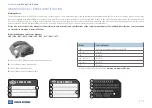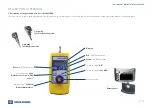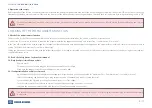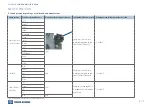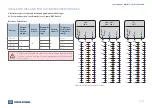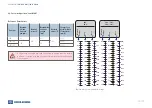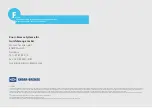
2/12
» Y119119 – (EN - REV. 001) | JULY 2020
Note:
The safety advice listed below is applicable to general service and diagnostic work on braking systems. Also observe any recommendations from the axle or vehicle
manufacturer concerning towing, jacking-up and securing the vehicle.
CAUTION:
KNORR-BREMSE IS NOT LIABLE FOR ANY INJURIES OR DAMAGES CAUSED BY IMPROPER USE OF SPECIFIED SERVICE KITS AND/OR SERVICE TOOLS. FURTHERMORE, MISUSE
OF TOOLS OR INCORRECT INSTALLATION OR APPLICATION OF SERVICE KITS MAY RESULT IN DAMAGE OR POTENTIALLY UNSAFE VEHICLE OPERATIONS. IN THIS CASE, KNORR-BREMSE
DOES NOT HAVE ANY WARRANTY OBLIGATIONS.
Before and whilst working on or around compressed air systems and devices, the following precautions should be observed, along with the many hazard notes contained throughout
the document:
1
Always wear safety glasses when working with air pressure.
2
Never exceed the vehicle manufacturer’s recommended air pressures.
3
Never look into air jets or direct them at anyone.
4
Never connect or disconnect a hose or line containing pressure; it may whip as air escapes.
5
When removing or servicing a product, ensure all pressure related to the specific system it is contained in has been depleted to 0 bar. Be aware that if the vehicle is equipped
with an air dryer system, it can also contain air pressure along with its purge reservoir, if fitted, even after pressure has been drained from the other reservoirs.
6
If it is necessary to drain the air pressure from reservoirs, etc., keep away from brake actuator push rods and levers since they may move as system pressure drops. On vehicles
fitted with air suspension, it is advised when undertaking such work, to support the chassis from sudden lowering and therefore prevent any possibility of being trapped
between the chassis and axle or ground.
7
Park the vehicle on a level surface, apply the parking brakes, and always chock the wheels as depleting vehicle air system pressure may cause the vehicle to roll.
8
When working under or around the vehicle, and particularly when working in the engine compartment, the engine should be shut off and the battery disconnected. Where
circumstances require that the engine be running, EXTREME CAUTION should be taken to prevent personal injury resulting from contact with moving, rotating, leaking, heated
or electrically charged components. Additionally, it is advisable to place a clear sign on or near the steering wheel advising that there is work in progress on the vehicle.
9
When working on vehicles equipped with air suspension, to guard against injury due to unexpected downward movement of the chassis caused by sudden pressure loss in
the suspension system, ensure that the vehicle chassis is mechanically supported with a ‘prop’ between the chassis and the axle or between the chassis and the ground.
10 Examine all pipework for signs of kinks, dents, abrasion, drying out or overheating. Be aware that kinks in pipework may result in air pressure being trapped in the pipework and
associated equipment. Replacement hardware, tubing, hose, fittings, etc. must be of equivalent size, type and strength as original equipment and be designed specifically for
such applications and systems. Check the attachment of all pipework; it should be installed so that it cannot abrade or be subjected to excessive heat.
11 Components with stripped threads or damaged/corroded parts must be replaced completely. Do not attempt repairs requiring machining or welding unless specifically stated
and approved by the vehicle or component manufacturer.
12 Never attempt to install, remove, disassemble or assemble a device until you have read and thoroughly understood the recommended procedures. Some units contain
powerful springs and injury can result if not properly dismantled and reassembled. Use only the correct tools and observe all precautions pertaining to use of those tools.
13 Before removing any device note its position and the connections of all pipework so that the replacement/serviced device can be properly installed. Ensure that adequate
support or assistance is provided for the removal/installation of heavy items.
SAFETY AND ENVIRONMENT GUIDELINES




